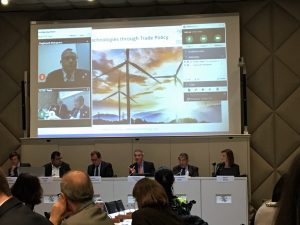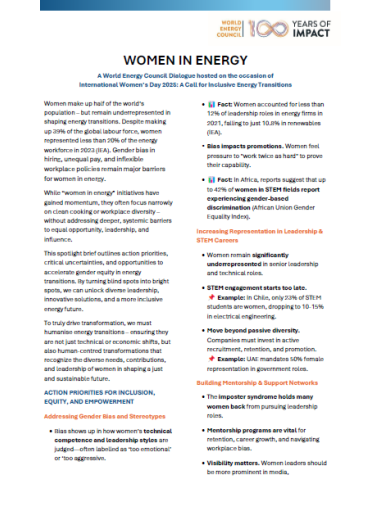Trade policy is one tool that can enable greater efficiency in global value chains for clean energy technologies. However, a wide range of trade-related obstacles currently hamper the potential of cost-optimisation in the value-chain.
These include import duties and a range of behind the border measures such as standards, conformity assessment procedures, local content requirements and procurement practices, as well as domestic regulations and other restrictions affecting trade in services.
The World Energy Council held a joint one-day dialogue with the International Centre for Trade and Sustainable Development (ICTSD) at the World Trade Organisation, to explore a better understanding of clean energy and its interface with trade policy to inform future trade policy making conducive to a scale up of clean energy.
The dialogue showcased findings from the Council’s recent research on non-tariff measures, (NTMS), and discussed different policy options for how trade policy could enable a scale up of the supply of clean energy, in the context of recent and ongoing trade initiatives.
“Liberalisation of environmental goods and services is definitely one of the most important international trade policies that may help achieve climate change mitigation”, stressed Mr Luis Adolfo Fernandez, Counsellor at the Mission of Costa Rica to the World Trade Organization (WTO), speaking at the event.
“Liberalisation of trade may be pursued by means other than plurilateral trade negotiations, such as the Environmental Goods Agreement. Domestic or unilateral elimination of tariffs represents a valuable option to enable a scale up of supply of clean energy”, he added.
“While reducing tariffs for clean energy technology is the low-hanging fruit” said Kuno Zurkinden of Switzerland’s State Secretariat for Economic Affairs (SECO), also speaking at the event, “NTMs have comparatively a much bigger impact and are more difficult to understand and to deal with”.
The elimination of costly, government-imposed trade barriers to trade in environmentally-friendly energy goods and services is key to reduce the cost of equipment and services. This can spur their utilisation, contributing to international GHG reduction objectives, increasing energy access in developing and emerging economies, and so reducing the cost of technology and energy itself.
In this regard, Tim Richards, Executive Chairman of the World Energy Council’s Knowledge Network on Rules of Trade and Investment, stated that, “trade liberalisation indeed helps meet the energy trilemma because it takes out government’s imposed costs”. His statement was reinforced by Ricardo Meléndez-Ortiz, Chief Executive of the ICTSD, who hopes to see a “move towards an aggressive competitive liberalisation” that would drive clean technology costs down.
During the debate on non-tariff measures, Ambassador Israhyananda Dhalladoo of the Mission of Mauritius to the WTO stressed the importance of “tackling local content requirements (LCRs) especially in developing countries”, adding that, “LCRs should not be binding for countries that rely on technology transfer from others”.
So how can trade policy initiatives best respond to these emerging challenges?
Christoph Frei, Secretary General of the World Energy Council had a take-away “wish-list” from the debate, whereby policy stability and harmonisation was recognised as a key tool to support investment in clean energy technologies. “This should be coupled with the conclusion of the Environmental Goods Agreement,” he said.
With the commencement of the EGA in 2014 and building on the 2012 Asia-Pacific Economic Cooperation’s (APEC) list of environmental goods, a number of WTO members are pursuing an initiative to eliminate tariffs, eventually extending benefits to all Members on a ‘most-favoured nation’ basis.
Although negotiations stalled in December 2016, Jonathan T. Fried, Ambassador of Canada to the WTO confirmed that there is still a “broad appetite to revitalise the EGA”.
The full video coverage of the three sessions is available on the World Energy Council YouTube channel:









